 As a teacher, Dhan Bahadur Khadka used to walk around his village urging parents to send their children to school and chasing after the students who missed class. The villagers looked up to him for advice and information. He was respected, and everyone called him 'Guruji'.
As a teacher, Dhan Bahadur Khadka used to walk around his village urging parents to send their children to school and chasing after the students who missed class. The villagers looked up to him for advice and information. He was respected, and everyone called him 'Guruji'.
That was 10 years ago. Ever since the Maoist 'Peoples' War' began teachers across Nepal and especially in these remote mountains of central Nepal have become pawns in the conflict.
Teachers like Khadka are prime targets of Maoists for extortion and have to pay five to 10 percent of their meager Rs 3,000 monthly salary to the Maoists. The rebels often abduct teachers along with students for weeklong forced indoctrination, and in their 'base areas' the Maoists force teachers to follow their 'revolutionary curriculum' or face punishment.
Most teachers have no choice, but that immediately makes them suspect in the eyes of the security forces who regard them as Maoists or at least as sympathisers.
"Either you do whatever they say or quit your job," says Khadka. Teachers in the remoter areas of Rukum have no choice and have to follow the diktat of the Maoist party.
Khadka's daily routine is simple. He goes to school, teaches his class and in the evening goes home and waits for day to break again. Once a month he gets Maoist permission to walk two days from Pipal VDC to the district capital in Musikot to collect his government salary and rushes back. One day's delay to pay the Maoist tax of five percent of his salary will mean public humiliation and threats.
There are plenty of examples of what happens to teachers who defy the Maoists. "We may be paid by the government but we are just teachers, we aren't political workers, why can't the Maoists understand the difference?" asks Narjit Basnet, whose left hand was hacked off by Maoists in Pipal VDC nine years ago.
No matter how hard he tries to forget the incident Basnet is reminded of it when he looks in the mirror.
Nearly 150 teachers have been killed in the last nine years of the war, according to a tally kept by the rights group, INSEC. Eighty-four of them were killed by the Maoists and the rest died in the hands of security forces. Both state and rebels have been equally responsible for the detention and torture of another 227 teachers.
Teachers are at the frontline of Nepal's decade-long war: the only government employees who still remain in the villages after police, postmen, health workers and agriculture extension workers fled. There are 147,000 teachers on the government's payroll and 19,000 of them in primary schools in the most remote VDCs of the country. Most of those still in the villages have to pay the Maoist tax, so it is the government that is indirectly subsidising the Maoists.
Ironically, it is the very fact that teachers remain in the village that makes them suspect in the eyes of the security forces. During past states of emergency it was the teachers who were detained, disappeared or killed because the security forces regarded them as Maoist sympathisers.
In fact, more than any other professionals, teachers have faced the most hardships during the conflict. Aside from physical harm, many teachers suffer from stress-related disorders from having to balance on a knife-edge between the rebels and the state every day.
One teacher who did not want to be named broke down as he told us: "I endure the beatings and the extortion but when one of my own students joined the Maoists and humiliated me in front of the whole village I just couldn't take it."
Khadka remembers the days in the early 1990s when he was almost revered in the villages. His task was not just to teach but to counsel villagers and inform them about what was happening in far-away Kathmandu or in the world. Sometimes he had to give health advice, suggestions to farmers and even settle disputes.
Today, Khadka walks with his head bent, trying not to be noticed by the security sentry on the outskirts of Musikot as he hurries back to his village with his paycheck. A slight hesitation and nervousness could mean detention. His colleagues have been beaten up for not giving details of Maoist positions. But Khadka knows that when he gets back to Pipal, he will be punished by the other side if he doesn't pay his tax.
"My father was just an ordinary teacher and we don't know why he was arrested," a young girl on a bus going from Nepalganj to Surkhet told us. A fellow inmate who witnessed the incident told the family after his release that the girl's father was taken to the jungle and shot dead.
"We are really demoralised, we are treated like criminals by the Maoists," explains Sakta Bahadur BK, a teacher from Rukum's Pokhara VDC. Dipendra Roka used to be a Maoist, quit the movement and is now living as a refugee in Musikot. He says it is the children of the poorest families who are most affected by the Maoist closure of schools: "Teaching has become an insecure job especially for those working in the villages and when we leave, the children don't get an education."
WEB EXCLUSIVE | PHOTO GALLERY
ALL PICS NARESH NEWAR
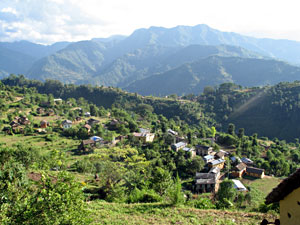
Village schools like in Rukum are under heavy maoist pressure.
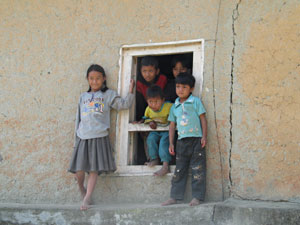
IN DHULIKHEL Children are equally vulnerable in semi urban areas.
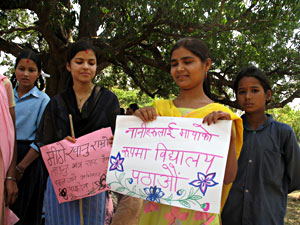
Students tired of Maoist pressure on schools are asking them to leave the children alone.
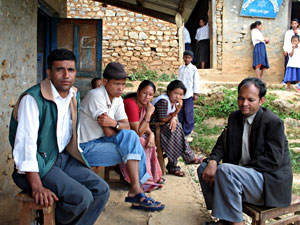
Rukum teachers have to spend most of their time worrying about their security and cannot concentrate on teaching.
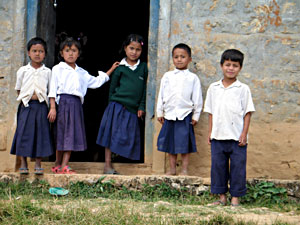
Rural children often end up playing due to absence of teachers in classrooms.
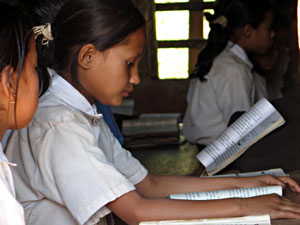
Children in villages study under stressful environment surrounded by army posts and fortified places.
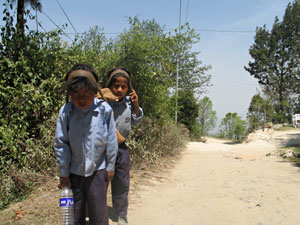
Many children displaced in the cities end up in worse conditions. They work harder and are malnourished.
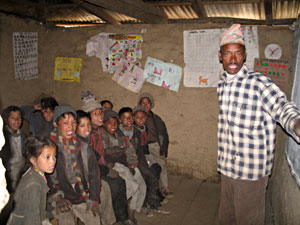
Teachers in Humla feel constantly under pressure from Maoists
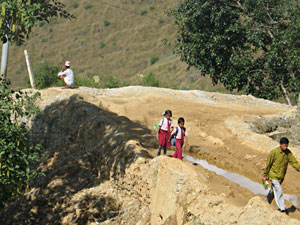
Young children from schools are usually abducted for the rebels\' indoctrination programmes.
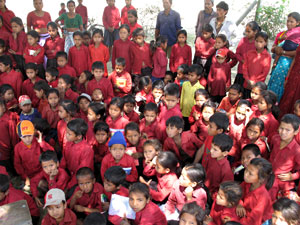
Enroling all children to schools has proved to be a national failure.


